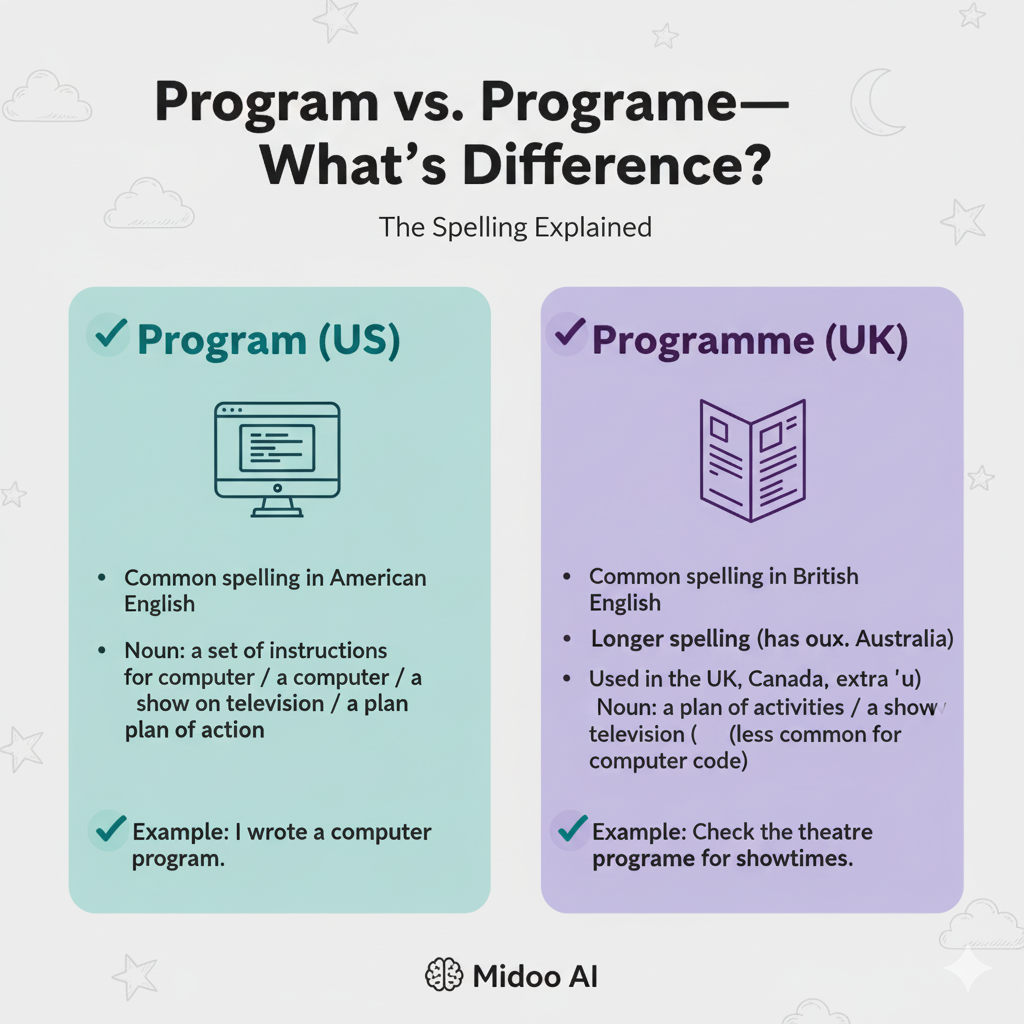Program vs. Programme—Which Spelling Should You Use?

English spelling can be tricky, especially when British and American English don’t always agree. One classic example is program vs. programme. Both look almost the same, but their usage depends on geography and context.
At Midoo AI, we know how confusing these spelling differences can be for learners. That’s why today we’ll break down when to use program and when to use programme, so you can write naturally whether you’re aiming for American or British English.
1. The Basic Difference
- Program → Standard spelling in American English for all uses.
- Programme → Preferred spelling in British English, but only in certain cases.
2. Program in American English
In the U.S., program is the only accepted spelling, no matter the context.
Examples (U.S. English):
- She is enrolled in a graduate program.
- I’m watching my favorite TV program.
- The computer program crashed suddenly.
- NASA launched a new space program.
- The after-school program helps students with homework.
Tip: If you’re writing for an American audience, always use program.
3. Programme in British English
In the U.K. and other countries that follow British spelling, programme is used when referring to shows, events, or plans of activities.
Examples (British English):
- The concert programme includes three symphonies.
- What’s on the TV programme tonight?
- The government launched a new welfare programme.
However, when talking about computers and coding, even the British stick to program.
Examples (British English):
- I’m writing a new computer program.
- This program helps manage customer data.
4. Quick Comparison Table
| Context | American English | British English |
|---|---|---|
| TV shows / events | Program | Programme |
| Government / activities | Program | Programme |
| Software / computers | Program | Program |
5. Common Mistakes to Avoid
❌ The BBC launched a new TV program. (in British English)
✅ The BBC launched a new TV programme.
❌ She’s studying a university programme. (in American English)
✅ She’s studying a university program.
Tip: Always think about your audience. Writing for U.S. readers? Stick with program. Writing for U.K. readers? Use programme unless it’s about software.
6. Easy Memory Hacks
- Program = U.S. (Always).
- Programme = U.K. (for events/shows/plans).
- Computers are universal → Program everywhere.
7. Real-Life Usage
- BBC iPlayer offers hundreds of TV programmes online. (U.K.)
- She developed a new training program for employees. (U.S.)
- The software program was updated last week. (both U.S. and U.K.)
- The summer reading programme was a huge success. (U.K.)
- He attended a leadership program at Harvard. (U.S.)
FAQ
Q1: Can I use “programme” in the U.S.?
Not really. Americans will see it as a spelling mistake. Stick to program in the U.S.
Q2: Do Canadians use “program” or “programme”?
Canadians follow British spelling for many words, but here they usually prefer program for both computers and general use.
Q3: Why does British English still use “programme”?
It’s mainly tradition. British English kept the French-influenced spelling programme, while American English simplified it to program.
Q4: Should I change my spelling based on my audience?
Yes. If your readers are mainly in the U.S., use program. If your readers are in the U.K., use programme (except for software).
Final Tip from Midoo AI
The difference between program and programme depends less on grammar and more on regional spelling preferences. Remember:
- American English → program for everything.
- British English → programme for shows and plans, but program for computers.
With practice—and the help of Midoo AI—you’ll never be caught second-guessing which spelling to use.